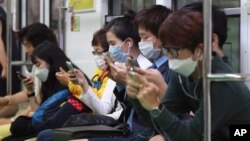South Korean health officials acknowledged Thursday that some changes need to be made in the country’s health care system in the wake of the outbreak of the Middle East Respiratory Syndrome (MERS). So far, 122 cases and 10 related fatalities have been recorded.
In retrospect, the MERS outbreak in South Korea could have been more effectively contained if the first patient, who contracted the deadly virus during a trip to the Middle East, was correctly diagnosed and immediately quarantined when he first went to a hospital emergency room in Seoul.
Instead, a number of things went wrong which, in the process, triggered the largest outbreak of MERS outside of Saudi Arabia.
Dr. John Linton, the Director of the International Health Care Center at Yonsei University’s Severance Hospital in Seoul, said the MERS crisis has already made doctors more aware of the need to respond quickly to isolate any possible cases of serious infectious diseases. But he also said South Korea needs medical facilities that are ready to deal with these types of outbreaks.
“We should have a designated area or areas in the country where disasters / infectious disease cases can be taken promptly,” said Linton.
Patient one went to four hospitals seeking treatment before he was diagnosed. Virtually all the subsequent MERS cases have been infected at medical facilities.
Kwon Deok-chul, the director of the national MERS management team with South Korea’s Ministry of Health and Welfare, blames the surge of MERS infections, to a large degree, on the Korean cultural practice of allowing a patient’s family members to serve as caregivers. He said this practice greatly increased the number of people exposed to the virus, especially when one considers that most hospital rooms have multiple beds. Kwon said new controls and more nurses are needed to solve this problem, but it is an expensive proposition.
He said it would be ideal to make single or double hospital rooms the standard, as they are in leading countries. But he said it would be difficult to do so considering conditions in the country.
MERS is a respiratory illness that initially produces flu like symptoms but can escalate to pneumonia and kidney failure. It was first identified in Saudi Arabia in 2012. There is no known cure or vaccine.
President Park Geun-hye postponed a visit to the United States to deal with the continued MERS outbreak at home.
Choi Chang-woo, the head of the civic group Citizens’ Solidarity for Safe Society, has criticized the government for being slow to react and not being more forthcoming with information. For more than a week the health ministry refused to release the names of the hospitals where MERS patients were being treated, a move that may have resulted in exposing more people to the virus.
He said the government is responsible for increasing public anxiety. When such outbreaks occur, he said, the government should release information so that all can actively respond to the situation based on the shared information.
Linton agrees that providing more information to the public is a lesson to be learned from this outbreak. But he said the public also needs to be more forthcoming with health authorities.
“A lot of the patients were not forthright with the number of hospitals they visited and they did not mention or kept it a secret that they went to such and such hospital,” he said.
Linton said he is cautiously optimistic that the number of new MERS cases will plateau in the next few days and then start coming down.
In addition to the increasing number of people infected with the deadly virus, the MERS outbreak in South Korea has caused significant economic damage. Tourism, retail shopping, movie theaters and other industries have all suffered declines in the last few weeks. To help companies cope during this crisis South Korea's central bank Thursday slashed borrowing costs to a record low.
VOA Seoul Producer Youmi Kim contributed to this report.





